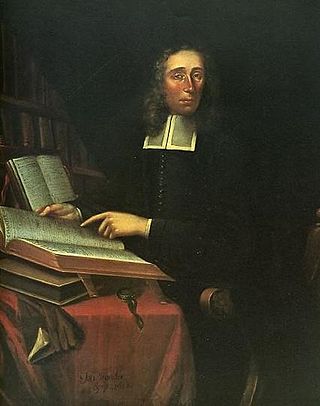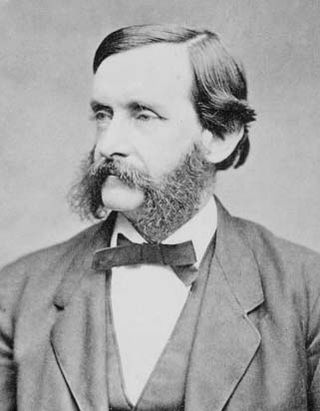
Cotton Mather was a Puritan clergyman and author in colonial New England, who wrote extensively on theological, historical, and scientific subjects. After being educated at Harvard College, he joined his father Increase as minister of the Congregationalist Old North Meeting House in Boston, Massachusetts, where he preached for the rest of his life. He has been referred to as the "first American Evangelical".

John Harvard (1607–1638) was an English Puritan minister in Colonial New England whose deathbed bequest to the "schoale or colledge" founded two years earlier by the Massachusetts Bay Colony was so gratefully received that the colony consequently ordered "that the Colledge agreed upon formerly to be built at Cambridge shalbee called Harvard Colledge".

Increase Mather was a New England Puritan clergyman in the Massachusetts Bay Colony and president of Harvard College for twenty years (1681–1701). He was influential in the administration of the colony during a time that coincided with the notorious Salem witch trials.

Anne Hutchinson was a Puritan spiritual advisor, religious reformer, and an important participant in the Antinomian Controversy which shook the infant Massachusetts Bay Colony from 1636 to 1638. Her strong religious formal declaration were at odds with the established Puritan clergy in the Boston area and her popularity and charisma helped create a theological schism that threatened the Puritan religious community in New England. She was eventually tried and convicted, then banished from the colony with many of her supporters.

Samuel Sewall was a judge, businessman, and printer in the Province of Massachusetts Bay, best known for his involvement in the Salem witch trials, for which he later apologized, and his essay "The Selling of Joseph" (1700), which criticized slavery. He served for many years as the chief justice of the Massachusetts Superior Court of Judicature, the province's high court.

The Winthrop Fleet was a group of 11 ships led by John Winthrop out of a total of 16 funded by the Massachusetts Bay Company which together carried between 700 and 1,000 Puritans plus livestock and provisions from England to New England over the summer of 1630, during the first period of the Great Migration.

John Endecott, regarded as one of the Fathers of New England, was the longest-serving governor of the Massachusetts Bay Colony, which became the Commonwealth of Massachusetts. He served a total of 16 years, including most of the last 15 years of his life. When not serving as governor, he was involved in other elected and appointed positions from 1628 to 1665 except for the single year of 1634.

John Cotton was a clergyman in England and the American colonies, and was considered the preeminent minister and theologian of the Massachusetts Bay Colony. He studied for five years at Trinity College, Cambridge, and nine years at Emmanuel College, Cambridge. He had already built a reputation as a scholar and outstanding preacher when he accepted the position of minister at St. Botolph's Church, Boston, in Lincolnshire, in 1612.
Thomas Danforth was a politician, magistrate, and landowner in the Massachusetts Bay Colony. A conservative Puritan, he served for many years as one of the colony's councilors and magistrates, generally leading opposition to attempts by the English kings to assert control over the colony.

Thomas Wentworth Higginson, who went by the name Wentworth, was an American Unitarian minister, author, abolitionist, politician, and soldier. He was active in abolitionism in the United States during the 1840s and 1850s, identifying himself with disunion and militant abolitionism. He was a member of the Secret Six who supported John Brown. During the Civil War, he served as colonel of the 1st South Carolina Volunteers, the first federally authorized black regiment, from 1862 to 1864. Following the war, he wrote about his experiences with African-American soldiers and devoted much of the rest of his life to fighting for the rights of freed people, women, and other disfranchised peoples. He is also remembered as a mentor to poet Emily Dickinson.
Francis Higginson (1588–1630) was an early Puritan minister in Colonial New England, and the first minister of Salem, Massachusetts. He was an ancestor of Thomas Wentworth Higginson.

Samuel Willard was a New England Puritan clergyman. He was born in Concord, Massachusetts, graduated from Harvard College in 1659, and was minister at Groton from 1663 to 1676, before being driven out by the Indians during King Philip's War. Willard was pastor of the Third Church, Boston, from 1678 until his death. He opposed the Salem witch trials and was acting president of Harvard University from 1701. He published many sermons; the folio volume, A Compleat Body of Divinity, was published posthumously in 1726.
Rev. Nicholas Noyes II was a colonial minister during the time of the Salem witch trials. He was the second minister, called the "Teacher", to Rev. John Higginson. During the Salem witch trials, Rev. Noyes served as the official minister of the trials.

Nathaniel Higginson was an English politician and a scion of the Higginson family of Salem, Massachusetts who served as the first Mayor of Madras, and later as the President of the colony from 3 October 1692 to 7 July 1698.
Thomas Gardner was an Overseer of the "old planters" party of the Dorchester Company who landed in 1624 at Cape Ann to form a colony at what is now known as Gloucester. Gardner is considered by some to have been the first Governor of Massachusetts, due to his being in authority in the first settlement that became the Massachusetts Bay Colony.
The Old Planters of Massachusetts were settlers of lands on Massachusetts Bay that were not part of the two major settlements in the area, the Plymouth Colony (1620), and the Massachusetts Bay Colony.

In the early 17th century, thousands of English Puritans settled in North America, almost all in New England. Puritans were intensely devout members of the Church of England who believed that the Church of England was insufficiently reformed, retaining too much of its Roman Catholic doctrinal roots, and who therefore opposed royal ecclesiastical policy. Most Puritans were "non-separating Puritans" who believed there should be an established church and did not advocate setting up separate congregations distinct from the Church of England; these were later called Nonconformists. A small minority of Puritans were "separating Puritans" who advocated for local, doctrinally similar, church congregations but no state established church. The Pilgrims, unlike most of New England's puritans, were a Separatist group, and they established the Plymouth Colony in 1620. Puritans went chiefly to New England, but small numbers went to other English colonies up and down the Atlantic.
Samuel Skelton was the first pastor of the First Church of Salem, Massachusetts, which is the original Puritan church in North America.
Samuel Appleton was a military and government leader in the Massachusetts Bay Colony and Province of Massachusetts Bay. He was a commander of the Massachusetts militia during King Philip's War who led troops during the Attack on Hatfield, Massachusetts and the Great Swamp Fight. He also held numerous positions in government and was an opponent of Governor Sir Edmund Andros.

Samuel Phillips was an American Congregational minister and the first pastor of the South Church in Andover, Massachusetts. His son, John Phillips, was the founder of Phillips Exeter Academy, and his grandson, Samuel Phillips Jr., was the founder of Phillips Academy Andover and briefly the lieutenant governor of Massachusetts.













